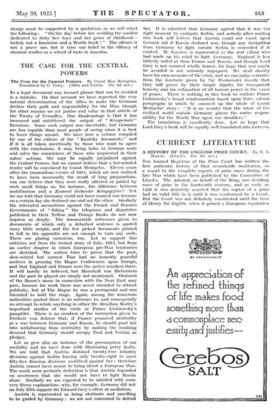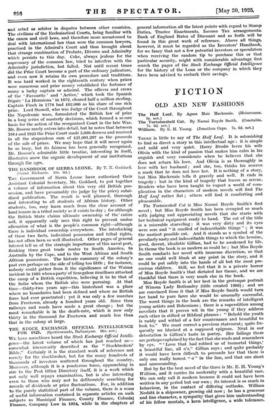CURRENT LITERATURE
THE learned Registrar of the Prize Court has written the first authentic history of that remarkable institution, as a sequel to the complete reports of prize cases during the
late War which have been published by the Committee of Lloyd's. The Admiral, on behalf of the King, was deciding cases of prize in the fourteenth century, and as early as 1426 it was definitely asserted that the captor of a prize had no valid title in it until it was condemned by a Court. But the Court was not definitely constituted until the time of Henry the Eighth, when it gained a European reputation and acted as arbiter in disputes between other countries. The civilians of the Ecclesiastical Courts, being familiar with the canon and civil laws, and therefore more accustomed to deal with international law than were the common lawyers, practised in the Admiral's Court and thus brought about that strange combination of Probate, Divorce and Admiralty which persists to this day. Coke, always jealous for the supremacy of the common law, tried to interfere with the Admiralty jurisdiction, but failed. Not until recent times did the Prize Court become a part of the ordinary judicature, and even now it retains its own procedure and traditions. It was hard worked in the eighteenth century when prizes were numerous and prize money established the fortunes of many a lucky captain or admiral. The officers and crews of the Favourite ' and ' Active,' which took the Spanish frigate ' La Hermiona ' in 1672, cleared half a million sterling. Captain Finch in 1778 had £62,000 as his share of one rich prize. Lord Stowell, who was Judge of the Court throughout the Napoleonic wars, formulated the British law of prize in a long series of masterly decisions, which formed a secure basis for the action of the reorganized Court in the late War. Mr. Roscoe rarely enters into detail, but he notes that between 1914 and 1923 the Prize Court made 5,086 decrees and received in all the stupendous sum of £21,001,297 as the proceeds of the sale of prizes. We may hope that it will never again be so busy, but its fairness has been generally recognized. Mr. Roscoe's admirable little treatise, interesting in itself, illustrates anew the organic development of our institutions through the ages.











































 Previous page
Previous page